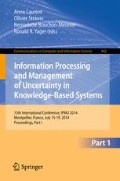Abstract
This paper focuses on resolution in linguistic first order logic with truth value taken from linear symmetrical hedge algebra. We build the basic components of linguistic first order logic, including syntax and semantics. We present a resolution principle for our logic to resolve on two clauses having converse linguistic truth values. Since linguistic information is uncertain, inference in our linguistic logic is approximate. Therefore, we introduce the concept of reliability in order to capture the natural approximation of the resolution inference rule.
Access this chapter
Tax calculation will be finalised at checkout
Purchases are for personal use only
Preview
Unable to display preview. Download preview PDF.
References
Chang, C.-L., Lee, R.C.-T.: Symbolic Logic and Mechanical Theorem Proving, 1st edn. Academic Press, Inc., Orlando (1997)
Ebrahim, R.: Fuzzy logic programming. Fuzzy Sets and Systems 117(2), 215–230 (2001)
Esteva, F., Godo, L., Noguera, C.: A logical approach to fuzzy truth hedges. Information Sciences 232, 366–385 (2013)
Ho, N.C., Wechler, W.: Extended hedge algebras and their application to fuzzy logic. Fuzzy Sets and Systems 52(3), 259 (1992)
Háek, P.: On very true. Fuzzy Sets and Systems 124(3), 329 (2001)
Klement, E.P.: Some mathematical aspects of fuzzy sets: triangular norms, fuzzy logics, and generalized measures. Fuzzy Sets Syst. 90(2), 133–140 (1997)
Le, V.H., Liu, F., Tran, D.K.: Fuzzy linguistic logic programming and its applications. Theory Pract. Log. Program. 9(3), 309–341 (2009)
Lee, R.C.T.: Fuzzy logic and the resolution principle. J. ACM 19(1), 109–119 (1972)
Mondal, B., Raha, S.: Approximate reasoning in fuzzy resolution. In: 2012 Annual Meeting of the North American Fuzzy Information Processing Society (NAFIPS), pp. 1–6 (August 2012)
Nguyen, C.H., Wechler, W.: Hedge Algebras: An Algebraic Approach in Struture of Sets of Linguistic Truth Values. Fuzzy Sets and Syst. 35, 281–293 (1990)
Nguyen, T.-M.-T., Vu, V.-T., Doan, T.-V., Tran, D.-K.: Resolution in linguistic propositional logic based on linear symmetrical hedge algebra. In: Huynh, V.N., Denoeux, T., Tran, D.H., Le, A.C., Pham, B.S. (eds.) KSE 2013, Part I. AISC, vol. 244, pp. 337–350. Springer, Heidelberg (2014)
Phuong, L.A., Khang, T.D.: A deductive method in linguistic reasoning. In: 2012 2nd International Conference on Uncertainty Reasoning and Knowledge Engineering (URKE), pp. 137–140 (2012)
Phuong, L.A., Khang, T.D.: Linguistic reasoning based on generalized modus ponens with linguistic modifiers and hedge moving rules. In: 2012 International Conference on Fuzzy Theory and it’s Applications (iFUZZY), pp. 82–86 (2012)
Robinson, J.A.: A machine-oriented logic based on the resolution principle. J. ACM 12(1), 23–41 (1965)
Shen, Z., Ding, L., Mukaidono, M.: Fuzzy resolution principle. In: Proceedings of the Eighteenth International Symposium on Multiple-Valued Logic, pp. 210–215 (1988)
Smutná-Hliněná, D., Vojtáš, P.: Graded many-valued resolution with aggregation. Fuzzy Sets and Systems 143(1), 157–168 (2004)
Tran, D.-K., Vu, V.-T., Doan, T.-V., Nguyen, M.-T.: Fuzzy linguistic propositional logic based on refined hedge algebra. In: 2013 IEEE International Conference on Fuzzy Systems (FUZZ), pp. 1–8 (2013)
Vojtás, P.: Fuzzy logic programming. Fuzzy Sets and Systems 124(3), 361–370 (2001)
Vychodil, V.: Truth-depressing hedges and bl-logic. Fuzzy Sets and Systems 157(15), 2074 (2006)
Weigert, T.J., Tsai, J.-P., Liu, X.: Fuzzy operator logic and fuzzy resolution. J. Autom. Reasoning 10(1), 59–78 (1993)
Zadeh, L.A.: Fuzzy sets. Information and Control 8(3), 338–353 (1965)
Author information
Authors and Affiliations
Editor information
Editors and Affiliations
Rights and permissions
Copyright information
© 2014 Springer International Publishing Switzerland
About this paper
Cite this paper
Nguyen, TMT., Vu, VT., Doan, TV., Tran, DK. (2014). Resolution in Linguistic First Order Logic Based on Linear Symmetrical Hedge Algebra. In: Laurent, A., Strauss, O., Bouchon-Meunier, B., Yager, R.R. (eds) Information Processing and Management of Uncertainty in Knowledge-Based Systems. IPMU 2014. Communications in Computer and Information Science, vol 442. Springer, Cham. https://doi.org/10.1007/978-3-319-08795-5_36
Download citation
DOI: https://doi.org/10.1007/978-3-319-08795-5_36
Publisher Name: Springer, Cham
Print ISBN: 978-3-319-08794-8
Online ISBN: 978-3-319-08795-5
eBook Packages: Computer ScienceComputer Science (R0)

